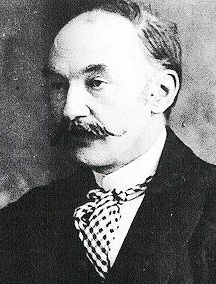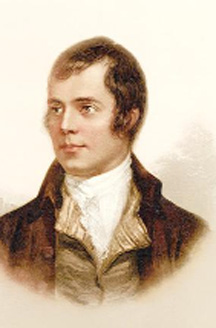Should auld acquaintance be forgot, and never brought to
mind?
Should auld acquaintance be forgot, and auld lang syne?
Chorus:
For auld lang syne, my jo, for auld lang syne
We’ll take a cup o’ kindness yet, for auld lang syne.
And surely ye’ll be your pint-stowp! and surely I’ll be mine!
And we’ll tak a cup o’ kindness yet, for auld lang syne.
We twa hae run about the braes, and pu’d the gowans fine;
But we’ve wander’d mony a weary fit, sin auld lang syne

But seas between us braid hae roar’d sin auld lang syne.
And there’s a hand my trusty fiere! And gie’s a hand o’ thine!
And we’ll tak a right gude-willy waught for auld lang syne.

We have already established that the best of the ‘seasonal’ poems have traditionally had interests well beyond superficial celebration of the season. Some of them use the season as a thematic base from which to make statements on significant issues. While doing this they end up as timeless classics of great literature ‘for all seasons’ free of any boundaries of place or calendar.
This is the case in what may be easily accepted as the greatest Christmas poem, The Journey of the Magi by TS Eliot, which is not really a Christmas poem, although it tells a story of the nativity. Eliot retells the story of the three wise men from the East who visited the birthplace of Jesus, but he chooses to have it narrated years later by one of the Magi, a king who was an unbeliever, who questioned the importance of the journey and was not even impressed by what he saw. He sums it up with the understatement:
we . . . arrived at evening, not a moment too soon
Finding the place; it was (you may say) satisfactory.
This was after a long, hard, unconvincing journey.
A cold coming we had of it,
Just the worst time of the year
For a journey, and such a long journey [. . .]
The cities hostile and the towns unfriendly
And the villages dirty and charging high prices [. . .]
With the voices singing in our ears, saying
That this was all folly.

But the real key to the narrative comes at the end, also cleverly understated, in which the Magus reflects that indeed the seemingly uneventful birth he witnessed did change the world. At least, he no longer feels comfortable with the way of life in his own kingdom. The birth was the death of the old dispensation.
But no longer at ease here, in the old dispensation,
With an alien people clutching their gods.
I should be glad of another death.
It is no different with the great New Year’s poems. The best known and most popular of them all is one used in all parts of the world as a festive song, chorused by all at midmight on New Year’s Eve to “ring out the old and ring in the new” year. (Even that idiom which is now a cliché, is a line from another classic ‘New Year’ poem, In Memoriam by Alfred Lord Tennyson.) This universal chorus is performed in Britain with a ritual of hand-holding and repeated around the world by people who hardly know what it means and who mostly sing the wrong words.
Yet it is one of the classic New Year poems given to the world by Robert Burns, the all-time National Poet of Scotland. It is Auld Lang Syne, composed by Burns in 1788, but really taken from traditional Scottish verses and folk songs which Burns collected and set down. It has its origins in old oral Scots folk poetry and resembles an earlier version by James Watson called Old Long Syne recorded in 1711. The literal translation from the Scots ‘auld lang syne’ is ‘old long since,’ more easily rendered as ‘old long ago’ or ‘times long gone.’ It has even been used at the beginning of old Scottish fairy tales to mean ‘once upon a time.’ It is a virtual anthem and a customary part of the celebration of Hogmanay (Old Year’s Night) in Scotland.
Most people erroneously believe the song is about forgetting the past and embracing the new. But for the great poet Burns, known for writing in old Scots dialect and for his sympathetic association with the folk, the meaning goes deep. It is a plea for honouring old traditions, a sense of the spirit of humanity, and of not forsaking the old for the new.
While looking forward to the new, it retains the value of old friends. It is to be noted that while the older version by Watson is a love song dedicated to a lover, Burns’s poem is about mankind, friendship and brotherhood. It pledges that distance and time will not cause separation.
Note also the important and repeated reference to drink in the pint-stowp and the gude-willy waught. Burns is also known for poems in praise of drink, and this is one. Drinking ‘a pint’ is a comfort in which the poor can partake, and often one of their few comforts. But more than that, the drink becomes ‘a cup of kindness’; human kindness is not to be forgotten and this kindness is at the heart of the sharing of a drink.
Another far less known but excellent New Year’s poem is The Darkling Thrush by English novelist Thomas Hardy. It was published at the turn of the century in The London Times on January 1, 1901 to mark the New Year 1901, but more than that it also signalled the passing of the nineteenth century and the beginning of the twentieth. To emphasize this, it used to carry a sub-title: By the Century’s Deathbed. Hardy, who is known for recording the culture of the English County of Wessex, was articulating the state of the times as he, and the Modernist poets who were to follow, saw it. The outlook was bleak and dismal; lost, faithless and without direction. This suited Hardy’s own tragic, deterministic disposition.
The poem describes the “century” in terms of cold stark death, in a bitter winter, dark and cheerless. It was afternoon in “the weakening eye of day” and everyone “that haunted nigh” huddled by the fire. The landscape looked like “the Century’s corpse outleant” with the wind “his death lament.” The poet, like everyone else, was “fervourless.” This is how Hardy chose to describe the passing of New Year’s Eve into the New Year and the passing of the 19th into the 20th century. The only hopeful note was the singing of a bird.
. . . At once a voice arose among the bleak twigs overhead
In a full-hearted evensong of joy illimited;
An aged thrush, frail, gaunt, and small, in blast-beruffled plume,
Had chosen thus to fling his soul upon the growing gloom.
So little cause for carollings of such ecstatic sound
Was written on terrestrial things afar or nigh around,
That I could think there trembled through
His happy good-night air
Some blessed Hope, whereof he knew and I was unaware.





